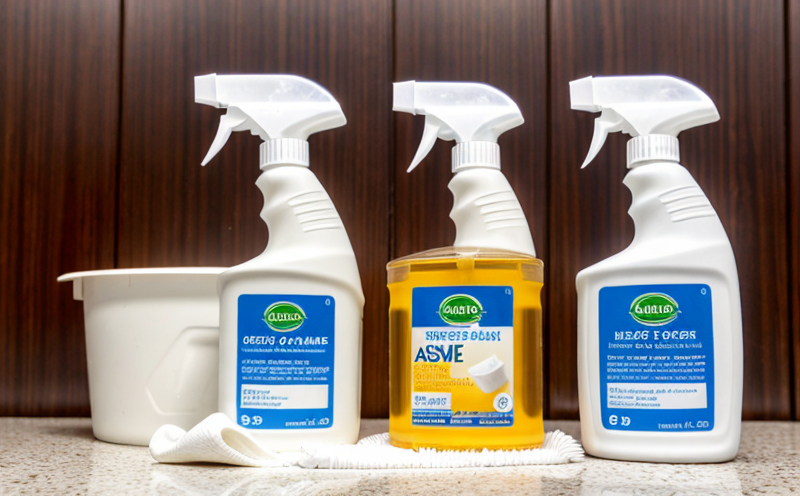BS EN 1656 Veterinary Bactericidal Testing of Hygiene Products
The BS and the European standard (CEN) have jointly developed BS EN 1656 to ensure that hygiene products are effective against certain veterinary bacteria. This test is crucial for manufacturers of cleaning agents, sanitizers, and other hygiene products intended for use in veterinary settings.
The standard specifies the methods for evaluating the effectiveness of hygiene products against specific veterinary pathogens such as Escherichia coli (E. coli), Staphylococcus aureus (S. aureus), Pseudomonas aeruginosa (P. aeruginosa), and other relevant bacteria that can cause infections in animals.
The testing process involves inoculating the hygiene product onto agar plates containing the target pathogens, incubating them under controlled conditions to allow bacterial growth, and then exposing these cultures to the test agent for a specified duration. The efficacy is determined by comparing the number of viable bacteria before and after treatment with the hygiene product.
Compliance with this standard ensures that manufacturers meet regulatory requirements and provide products that are safe and effective in reducing bacterial contamination risks in veterinary environments. This is particularly important as veterinarians, animal handlers, and pet owners rely on these products for maintaining hygienic conditions.
The BS EN 1656 test protocol also emphasizes the importance of proper specimen preparation, which includes ensuring that all containers used are sterile and that samples are handled in a controlled environment to prevent cross-contamination. The use of appropriate controls is essential to ensure accurate results.
Manufacturers who adhere to this standard can demonstrate their commitment to quality and safety, thereby gaining the trust of customers and regulatory bodies alike. This not only enhances product reputation but also facilitates easier market entry into EU member states where compliance with European standards is mandatory.
In addition to its role in ensuring product efficacy, BS EN 1656 plays a critical part in protecting public health by reducing the spread of antibiotic-resistant bacteria among animals and preventing zoonotic diseases. By adhering to this standard, companies contribute positively towards maintaining both animal welfare and human health.
Why Choose This Test
Selecting BS EN 1656 for veterinary bactericidal testing offers numerous advantages that cater to the unique needs of manufacturers in this sector. Firstly, it provides a robust framework that ensures consistent and reliable results across different batches of products and facilities.
The standard's rigorous procedures help identify any potential issues early on, allowing manufacturers to make necessary adjustments before product launch. This proactive approach minimizes the risk of non-compliance with regulations later down the line.
Furthermore, compliance with BS EN 1656 enhances brand reputation and customer confidence. Consumers are increasingly aware of hygiene standards in relation to animal health and welfare, making it essential for companies to meet these expectations. By choosing this test, manufacturers can position themselves as leaders in their field, attracting more customers and boosting sales.
Another significant benefit is the facilitation of market access into EU markets. Many countries within the European Union have adopted BS EN 1656 as a mandatory requirement for hygiene products intended for use in veterinary settings. Ensuring compliance opens doors to these lucrative markets, providing opportunities for increased revenue and global expansion.
Lastly, choosing this test allows companies to stay ahead of industry trends by continuously improving their products based on the latest scientific research and best practices outlined in the standard. This forward-thinking attitude ensures sustained competitiveness in an ever-evolving market landscape.
Customer Impact and Satisfaction
The implementation of BS EN 1656 veterinary bactericidal testing has a direct positive impact on customer satisfaction by providing them with products that effectively reduce bacterial contamination risks. This is particularly important in veterinary settings where hygiene plays a crucial role in preventing the spread of infections.
Customers can be assured that these products meet stringent international standards, thereby enhancing their trust and confidence in the brand. This trust translates into higher customer loyalty and repeat purchases, which are vital for long-term business success.
In addition to increased sales, satisfied customers may also recommend the product to others within the veterinary community, potentially expanding the customer base further. Positive word-of-mouth can significantly influence purchasing decisions among professionals who prioritize quality and safety in their practices.
From a broader perspective, complying with BS EN 1656 contributes positively towards maintaining both animal welfare and human health by reducing the risk of antibiotic resistance and zoonotic diseases. This aligns closely with the values held by many customers today, making it an attractive feature for them to consider when selecting products.
The ability to provide consistent and reliable results across multiple batches also improves customer satisfaction by ensuring that every product purchased meets the expected standards. This consistency builds trust between manufacturers and their clients, fostering stronger relationships over time.
International Acceptance and Recognition
The BS EN 1656 standard enjoys widespread acceptance across the European Union and beyond due to its rigorous methodology and emphasis on ensuring product efficacy. Many countries within the EU have adopted this standard as a mandatory requirement for hygiene products intended for use in veterinary settings.
Adherence to this standard not only enhances brand reputation but also facilitates easier market entry into these markets, providing opportunities for increased revenue and global expansion. The international recognition of BS EN 1656 underscores its importance in the field of hygiene product manufacturing.
The standard's acceptance is further bolstered by its alignment with other international standards such as ISO and ASTM, which are widely recognized globally. This harmonization ensures that products tested according to these specifications meet consistent quality benchmarks worldwide.
For manufacturers looking to expand their operations internationally, ensuring compliance with BS EN 1656 can open doors to new markets while maintaining the trust of existing customers. It demonstrates a commitment to excellence and innovation in product development, setting standards for others to follow.





